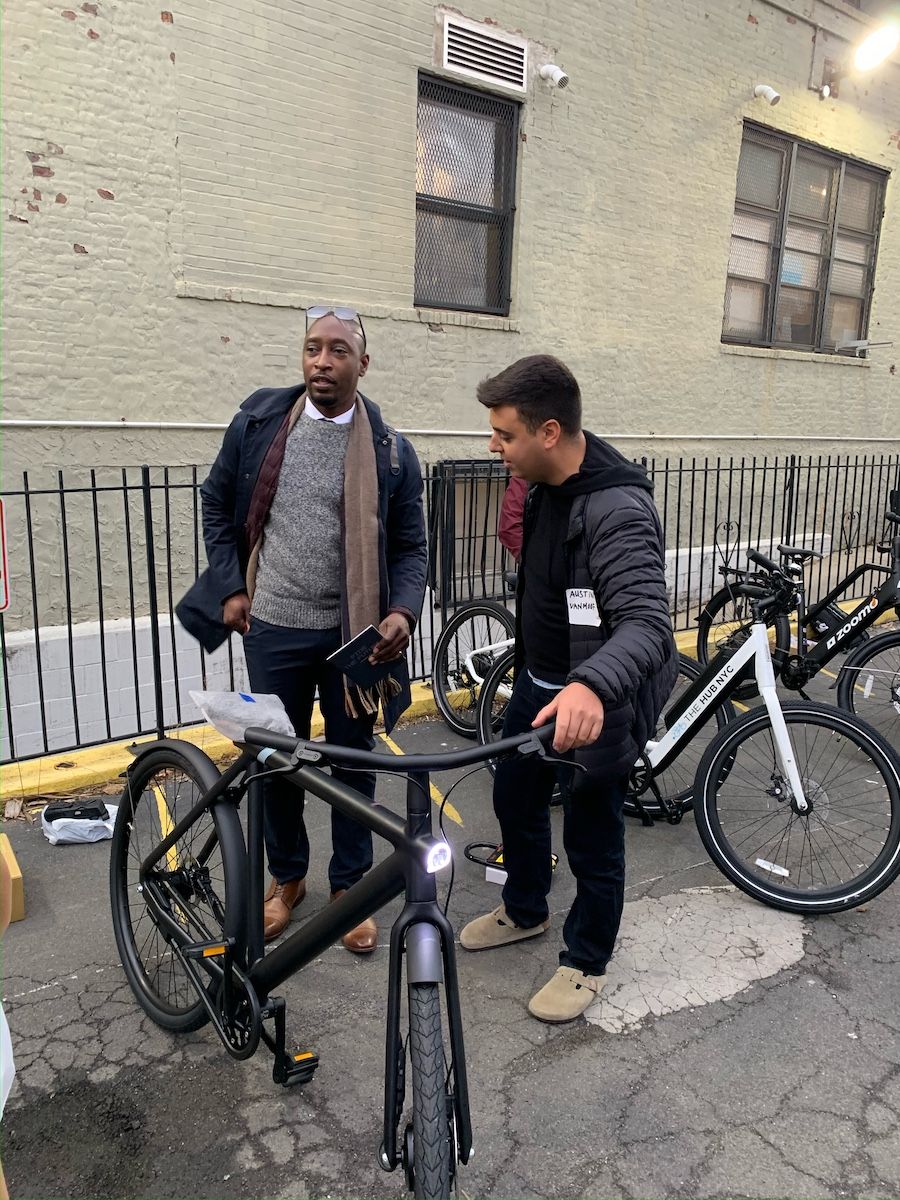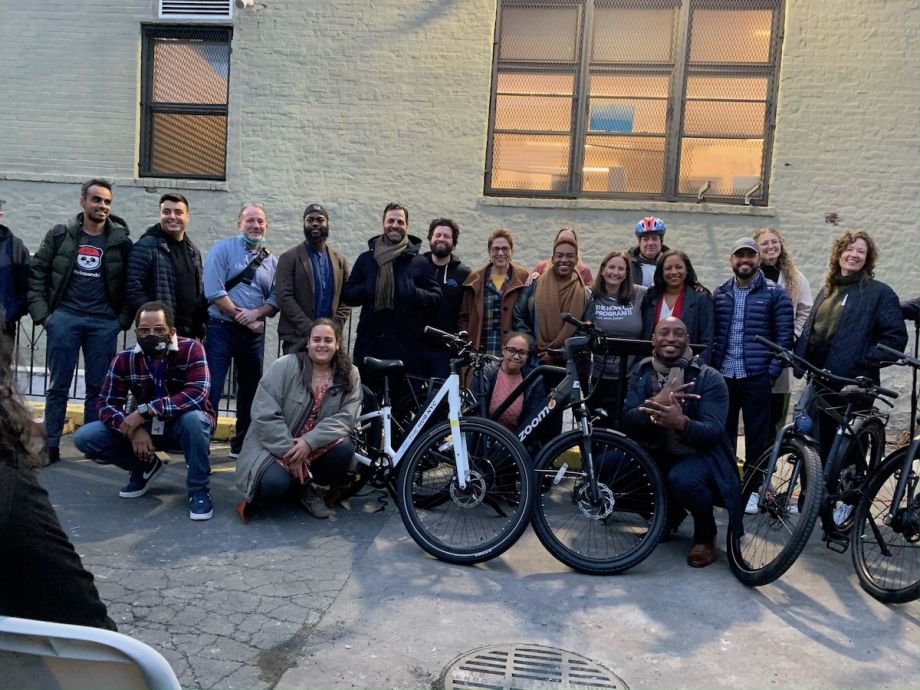Solomon Smart has been biking to his work as senior center director at BronxWorks, a senior recreational center for many years. The ride is just 10 minutes, but it’s a strenuous 10 minutes. It’s a hilly trek, including what Smart describes as “the demoralizer hill.”
His commute recently got much easier, if not much smoother, thanks to a recent purchase of an electronic bike. The e-bike is a major upgrade over his traditional mechanical bicycle, and it makes his commute less exhausting—and even fun. “When you go through that hill you’re out of breath and tired,” says the 46-year-old native New Yorker. “Now with e-bike, I just roll through the hills. I don’t have to worry about sweating or looking like a hot mess.”
Thousands of New Yorkers bike to work, but Smart’s story is remarkable in that he got a substantial discount through Spring Bank, a CDFI based in the Bronx, to purchase an e-bike as part of an initiative to make commuting easier and more affordable for frontline or essential workers in the Bronx and Brooklyn boroughs of New York, where most of the 1 million frontline workers live. These are heavily populated areas where public transportation isn’t as accessible as it might be in Manhattan.

Solomon Smart purchases an e-bike in early December. (Photo courtesy of Spring Bank)
Spring Bank announced in October that it was one of 31 CDFIs that received a financial inclusion grant out of a nearly $5 million pool that will allow it to provide microloans of around $500 to $2,500 with no minimum credit score requirement to NYC’s essential workers to purchase e-bikes and scooters. Applicants like Smart get a discount from participating e-bike vendors such as VanMoof, and banks offer a loan to help cover the remaining cost. E-bikes aren’t cheap; they normally cost more than $1,500, while regular bicycles and e-scooters can run to more than $500.
Smart wanted an e-bike for years but couldn’t afford it. He purchased his bike recently with a loan from Spring Bank and a 50% discount on the $2,298 price from VanMoof, a premier e-bike maker. He pays $100 a month on the loan for what he calls the “Apple of electronic bikes” for its sleekness and power to defeat the “demoralizer hill.”
The overall mission statement of this micro-mobility initiative is ambitious: to “address a fundamental injustice in transportation,” according to The Equitable Commute Project, (ECP), the coalition of organizations promoting the sustainable micromobility project.
The Covid-19 pandemic amplified the transportation challenges for disadvantaged New Yorkers, especially frontline workers who, like Smart, had to work during the pandemic. Many can’t afford cars and had to wait hours for slow-running subways. ECP notes that nearly 250,000 essential workers “are (of) lower-income,” generally earning less than $52,000 a year for a family of four.
Biking is big in NYC—and getting bigger. The micromobility initiative for essential workers comes as calls grow for the city to reimagine its congested streets. Despite the well-deserved image of a city of car-clogged streets beneath monolithic skyscrapers, about 800,000 New Yorkers ride bikes regularly. The pandemic has also increased the popularity of biking and other micromobility options such as scooters. Leading the NYC biking culture will be the incoming mayor. Dubbed “the first bike mayor,” Eric Adams, who was sworn in last month, has pledged to bike to his job at City Hall regularly and to add more bike lanes.
Micromobility advocates tout the potentially significant environmental benefit of getting more people out of cars and onto eco-friendly transportation like bikes. In addition, the micromobility initiative could help spur economic revitalization in NYC. One of the goals of the project is to train New Yorkers for jobs in the micromobility industry, which is estimated to grow to a $300 billion to $500 billion market by 2030.
The genesis of the NYC program originated thousands of miles across the pond—in Lison, Portugal. Marianna Koval, director, Invest NYC SDG, an institute of the Center for Sustainable Business at NYU Stern, got a proposition from the World Business Council for Sustainable Development, a global consortium of CEOs dedicated to creating a sustainable world, during the height of the social unrest in July 2020. The group asked her to start a program to engage CEOs in sustainable transportation. After much research and along with local transportation experts at agencies like Electric Avenue, a public affairs and mobility strategy firm, she realized that providing affordable and accessible transportation to underserved New Yorkers was a solid blow against racial inequality in transportation.
“We really realized that micromobility was the right way to address racial equity and create transportation justice,” Koval says.
A three-year pilot program was launched in December with the aim of getting affordable e-bikes and scooters into the hands of 5,000 frontline workers. Organizers like Melinda Hanson, co-founder of Electric Avenue, hope it will show enough promise to be replicated across the country. Already, Portland, Oregon, is aiming to launch a similar program. “It’s taken off,” Hanson says.
Indeed, each player in the initiative harbors high hopes for the program. Austin Durling, spokesman for VanMoof, thinks it could be the “first small step” toward transforming NYC into another bike-friendly Amsterdam, VanMoof’s headquarters. While Spring Bank sees it as a promising financial instrument.
“Not all our small loans are sustainable, but we think this one has possibilities,” says Melanie Stern, Spring Bank’s director of consumer lending. “It worked for us on multiple levels.”
But initial beneficiaries of the e-bike program like Smart are just looking forward to enjoying the ride.
EDITOR’S NOTE: This article was updated to clarify the grant Spring Bank received and how their e-bike loan program works.

This story is part of our series, CDFI Futures, which explores the community development finance industry through the lenses of equity, public policy and inclusive community development. The series is generously supported by Partners for the Common Good. Sign up for PCG’s CapNexus newsletter at capnexus.org.
Christopher C. Williams is a New Jersey-based freelance financial writer. He worked for many years with Dow Jones Newswires and Barron’s Financial Weekly and has contributed to publications including the Wall Street Journal, The New York Times and Essence magazine. He focuses on the intersection of business, economic equity and racial justice.


_600_350_80_s_c1.jpeg)





_920_518_600_350_80_s_c1.jpg)
_600_350_80_s_c1.jpg)






